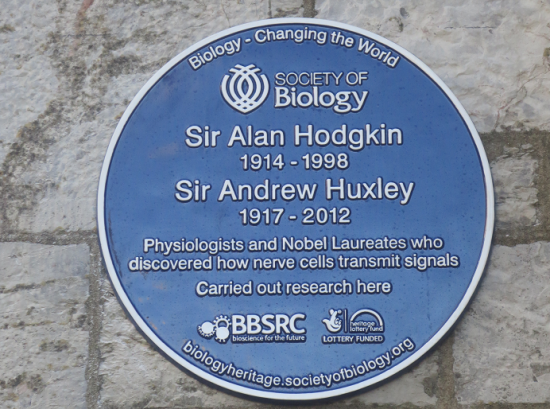News archive
Plaque celebrating Hodgkin and Huxley unveiled in Plymouth
- Details
- 04 March 2015
This morning a plaque celebrating Sir Alan Hodgkin and Sir Andrew Huxley, who put electrodes into squid to further understanding of our nervous system, was unveiled by the Society of Biology at the Marine Biological Association in Plymouth.

Sir Alan Hodgkin and Sir Andrew Huxley, carried out research at the Marine Biological Association (MBA), before and after the Second World War and went on to win a Nobel Prize for discovering how nerve cells transmit signals.
The Society of Biology installed the blue plaque as part of a new series of ten plaques around the UK celebrating eminent but sometimes unsung heroes of biology.
Professor Colin Brownlee FSB, director of the MBA, made a speech at the ceremony:
“Just over 75 years ago, Alan Hodgkin and Andrew Huxley, two Cambridge-based scientists, working at the MBA in Plymouth seized upon an important discovery, that the long finned squid found in the seas off Plymouth possessed a giant nerve fibre. This nerve fibre was about a hundred times thicker than normal nerve fibres. Crucially the giant nerve fibre was large enough to allow an electrode to be inserted along its length, enabling the voltage across the cell membrane to be recorded. Their subsequent experiments revealed how signals are sent along nerves – essentially how we see, hear and feel things and how our brains work. Their contribution to understanding the functions of the nervous system and brain cannot be overestimated. For their work they were awarded a share of the 1963 Nobel Prize for Physiology or Medicine.”
Lord Mayor and Lady Mayoress of Plymouth, Councillor Michael Fox and Mrs Rosemary Fox, also attended the plaque unveiling ceremony to celebrate these local heroes.
The new series of celebratory plaques also include those to: Steptoe, Edwards and Purdy, IVF pioneers, in Oldham; Richard Owen, who invented the word ‘dinosaur’ and founded the Natural History Museum, in Lancaster; and Dolly the sheep, and the team who created her, in Edinburgh.
The ten blue plaques are part of the national Biology: Changing the World project; which also includes a new app, website, public engagement programme and teaching resources. The free app, available in the apple and android app stores, uses your location to introduce you to the great biologists who lived and worked nearby and biological discoveries which were made in the area.
Dr Mark Downs FSB, chief executive of the Society of Biology said:
“We have a great heritage of scientific discovery and an exciting future, but the biologists who have contributed to our understanding of the world are not always given the appreciation they deserve. We are delighted to be giving these biologists the recognition awarded to other great historical figures through Biology: Changing the World. The project is also a celebration of biology and biologists today. The life sciences will be essential for solving the problems of the 21st Century such as food security and antibiotic resistance. By highlighting our great biology heritage we hope to inspire the next generation.”
The Biology: Changing the World project of the Society of Biology was developed in partnership with the Biotechnology and Biological Sciences Research Council (BBSRC) and received funding from the Heritage Lottery Fund.
Professor Jackie Hunter, chief executive of the BBSRC, said:
“I’m delighted that BBSRC has been involved with this scheme to raise the profile of unsung heroes of bioscience who have changed the world with their contributions. We hope that these plaques will spark curiosity and help inspire new generations to get involved in the biosciences, which will continue to change the world and help us meet the challenges of the future.”

